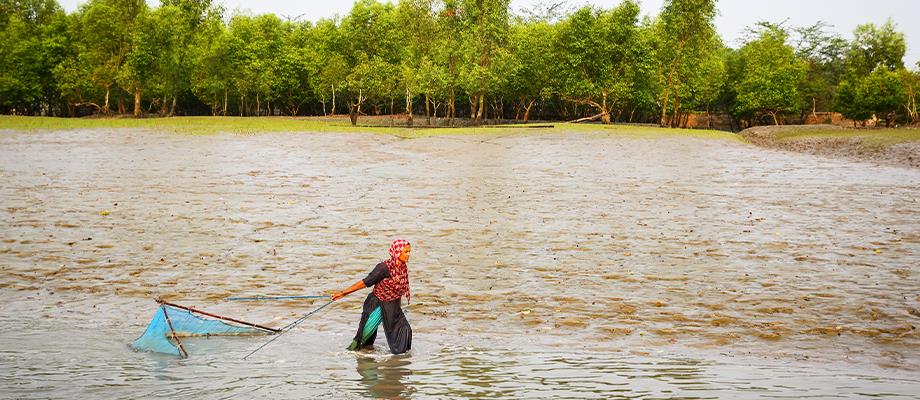Responsible governance of tenure and inland fisheries: more than simply fish

 ©Robert Arthur ©Robert Arthur |
Written by Robert Arthur, Equitable livelihoods team, Fisheries and Aquaculture Division, FAO
Inland fisheries and both diverse and widespread, taking place in aquatic environments ranging from large lakes, river, floodplains and coastal lagoons to much smaller ponds, streams, ditches, canals and rice fields (Funge-Smith, 2018). The majority of these fisheries are small-scale fisheries (SSF), contributing to the livelihoods of millions of people around the world. Because they mediate access, tenure arrangements, and the responsible governance of tenure, play essential roles in determining if and how people can benefit from these fisheries (FAO, 2016). The Voluntary Guidelines for Securing Sustainable Small-Scale Fisheries in the Context of Food Security and Poverty Eradication (SSF Guidelines) in its chapter 5a advise that small-scale fishing communities should have secure, equitable and socio-culturally appropriate tenure rights to fishery resources, fishing areas and adjacent land and forests. Experiences in inland fisheries reflect this, demonstrating how responsible tenure can be effective in promoting environmentally and socially responsible use, creating livelihood opportunities and fostering community relationships, including supporting vulnerable and marginalised groups, while maintaining productive fisheries (e.g. AfDB, 2022; Kelkar and Arthur, 2022, Arthur and Friend, 2011).
More than simply fish: the role of fishing days and fishing festivals
One widespread example that illustrates this are the ‘fishing days’ or ‘fishing festivals’ that can be observed in floodplain environments across South and Southeast Asia and in parts of Africa (e.g. Shyllon, 2007). These are based on management rights held by local authorities, which include village administrations and user groups, and which may also extend to include water and land management rights. The fishing events themselves attract large numbers of participants, sometimes numbering in the thousands, and usually take place as waters recede, coinciding with times of low agricultural labour demand. Fish in these environments at these times can experience high mortalities, so even intense fishing, sometimes referred to as ‘depletion fishing’, may not be destructive (e.g. Martin et al., 2011). Fishing on the day is usually restricted to a limited set of traditional small-scale gears. This includes types used by men, women and children to promote participation and has the added benefit of providing opportunities to share and pass on skills and knowledge.
It can be important that these events are not just about fishing, sometimes taking place in combination with other festivals. As such, they are also about coming together in ways that are facilitated by fishing and that support and reinforce reciprocal relationships, including between villages and social groups. This aspect can make important contributions to cultural heritage and social cohesion and even to maintaining peaceful relations (e.g.Argungu international fishing and cultural festival ). Participation may require the purchase of a ticket, the price of which is determined by gear type, and this can also provide opportunities for communities to generate income that can be used for community development.
 Buying a ticket to participate in a village-managed fishing day. ©Robert Arthur Buying a ticket to participate in a village-managed fishing day. ©Robert Arthur |
Tenure, livelihoods and fisheries management
What the example of the fishing days and fishing festivals illustrates is that tenure is not just about fish and fishers, and that responsibilities can extend beyond fish and fishing to support and enhance the collective and individual lives as lived within communities. These lives are also changing and where people may be finding employment opportunities elsewhere, these events can play important roles in maintaining connections to fishing, communities and traditional ways of life. It is also important to consider how these events relate to the wider fisheries management context and the role tenure plays in these. Thus, fishing days can be combined with gear restrictions and closed areas as well as commercial fishing, regulated open access and provisions for mobile or migrant fishers. For example, fishing may be restricted in areas such as riverine deep pools, floodplain channels and rice field water bodies in the dry season to protect large spawning fish. Collectively, these arrangements can ensure fisheries provide opportunities to meet livelihoods needs, including food and nutrition as well as playing important roles in conserving stocks and protecting habitats.
From this broader perspective, fishing days and festivals represent part of networks or mosaics of measures for managing fisheries that are based on traditional knowledge of both local environments and livelihoods. Despite often being labelled as ‘informal’, these arrangements can, in practice, be quite secure and may even take precedence over more formal arrangements. It is therefore critical to ensure that any changes to tenure arrangements and/or measures that are introduced serve to maintain or strengthen the role of fisheries, of user rights and the accountability of managers to existing rights holders. Existing instruments and frameworks can provide important opportunities for such engagement (Coates et al., 2023).
In conclusion, inland fisheries can provide important insights into the role of tenure in successful fisheries management and the ways that the governance of fisheries tenure is situated within community traditions and heritage, natural cycles and knowledge that extends beyond fisheries. This article focuses on fishing days and festivals but, in doing so, emphasises the importance of considering tenure arrangements in the wider context of environmental management, local lives and livelihoods. Local knowledge and traditions and the demonstrated capabilities of inland fisheries stakeholders to successfully manage fisheries can provide an important basis for empowering fishers and fisheries stakeholders in support of the responsible governance of tenure, enabling them to navigate change and creating possibilities for positive and consensual transformations.
References and relevant publications
Funge Smith (2018) Review if the state of the world fishery resources: inland fisheries. FAO, Rome.
